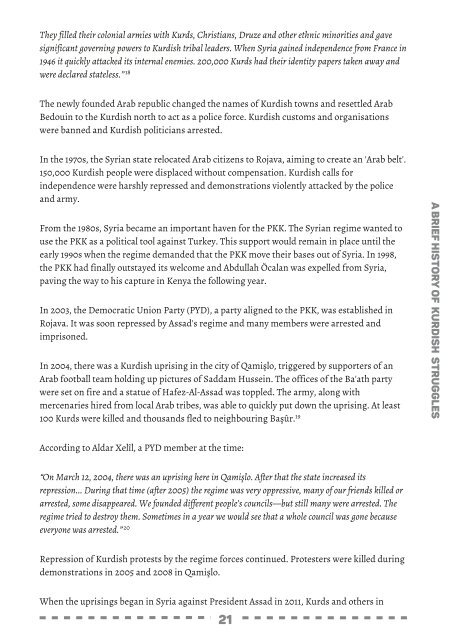STRUGGLES
Struggles-for-autonomy-in-Kurdistan
Struggles-for-autonomy-in-Kurdistan
You also want an ePaper? Increase the reach of your titles
YUMPU automatically turns print PDFs into web optimized ePapers that Google loves.
They filled their colonial armies with Kurds, Christians, Druze and other ethnic minorities and gave<br />
significant governing powers to Kurdish tribal leaders. When Syria gained independence from France in<br />
1946 it quickly attacked its internal enemies. 200,000 Kurds had their identity papers taken away and<br />
were declared stateless.” 18<br />
The newly founded Arab republic changed the names ofKurdish towns and resettled Arab<br />
Bedouin to the Kurdish north to act as a police force. Kurdish customs and organisations<br />
were banned and Kurdish politicians arrested.<br />
In the 1970s, the Syrian state relocated Arab citizens to Rojava, aiming to create an 'Arab belt'.<br />
150,000 Kurdish people were displaced without compensation. Kurdish calls for<br />
independence were harshly repressed and demonstrations violently attacked by the police<br />
and army.<br />
From the 1980s, Syria became an important haven for the PKK. The Syrian regime wanted to<br />
use the PKK as a political tool against Turkey. This support would remain in place until the<br />
early 1990s when the regime demanded that the PKK move their bases out ofSyria. In 1998,<br />
the PKK had finally outstayed its welcome and Abdullah Öcalan was expelled from Syria,<br />
paving the way to his capture in Kenya the following year.<br />
In 2003, the Democratic Union Party (PYD), a party aligned to the PKK, was established in<br />
Rojava. It was soon repressed by Assad's regime and many members were arrested and<br />
imprisoned.<br />
In 2004, there was a Kurdish uprising in the city ofQamişlo, triggered by supporters ofan<br />
Arab football team holding up pictures ofSaddam Hussein. The offices ofthe Ba'ath party<br />
were set on fire and a statue ofHafez-Al-Assad was toppled. The army, along with<br />
mercenaries hired from local Arab tribes, was able to quickly put down the uprising. At least<br />
100 Kurds were killed and thousands fled to neighbouring Başûr. 19<br />
a brief historyof kurdish struggles<br />
According to Aldar Xelîl, a PYD member at the time:<br />
“On March 12, 2004, there was an uprising here in Qamişlo. After that the state increased its<br />
repression... During that time (after 2005) the regime was very oppressive, many ofour friends killed or<br />
arrested, some disappeared. We founded different people’s councils—but still many were arrested. The<br />
regime tried to destroy them. Sometimes in a year we would see that a whole council was gone because<br />
everyone was arrested.” 20<br />
Repression ofKurdish protests by the regime forces continued. Protesters were killed during<br />
demonstrations in 2005 and 2008 in Qamişlo.<br />
When the uprisings began in Syria against President Assad in 2011, Kurds and others in<br />
21


